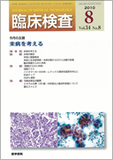Japanese
English
- 有料閲覧
- Abstract 文献概要
- 1ページ目 Look Inside
- 参考文献 Reference
①現代未病とは自覚症状がなくて検査値異常がある状態をいう.②WHOの健康寿命は「日常的に介護を必要としないで,自立した生活ができる生存期間」のことである.この健康に未病が含まれる.③肥満はメタボリック症候群,循環器病が高頻度で,長期介護臥床の予備軍となり得る.④加齢で臓器予備機能が減少し,未病は予備機能減少が速くなる.最低必要機能に達すると病気になり,その期間が健康寿命である.⑤高齢者は予備機能が低下した高齢未病状態といえる.
1. The modern "Mibyou" with the evidence of medicine was defined as the no subjective symptom but having the abnormal clinical examination data and should be the early phase of disease.
2. The healthy longevity was define as the life duration of health defined as being "a state of complete physical, mental, and social well-being and not merely the absence of disease or infirmity" in WHO in 1948. Mibyou is included in health defined in WHO.
3. The abdominal obesity is the main cause of the metabolic syndrome and also the cardio- and cerebro-vascular diseases. Recently the epidemiological report was issued that in Japanese with 5kg and more of the body weight gain after 20 years of age the death rate was lower when compared with that in those under 5kg of the body weight gain or the body weight loss. These data suggested that the people with abdominal obesity must be the reserve persons of the long time medical care.
4. Mibyou should lower the reserved function of organs or tissues quickly. When the reserved function is vanished and the total function reaches minimal fuction which the organs or tissues is required for living, the disease or organ insufficiency happens. The duration for reaching the minimal function should be the healthy longevity.
5. The aged people should be in Mibyou with the reduced reserved organ or tissue function.

Copyright © 2010, Igaku-Shoin Ltd. All rights reserved.


